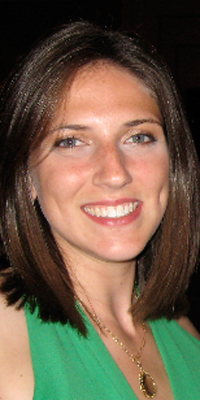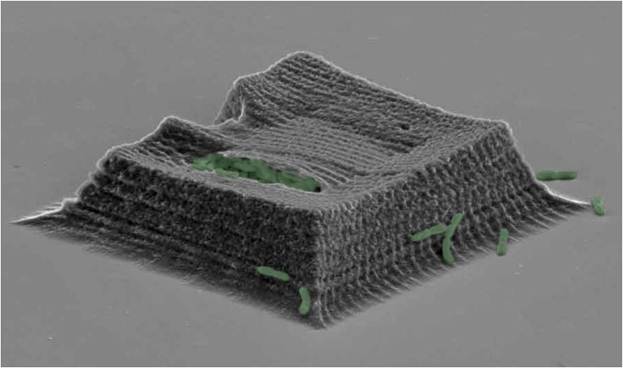Aimee Wessel
Dallas, Texas
 Research interests
Research interestsProbing prokaryotic social behaviors with bacterial “lobster traps”
In nature bacteria frequently exist in microcolonies—aggregates of densely packed cells. A single cluster (10^1 to 10^5 cells) is often all that is required to seed many bacterial infections. Studying the growth characteristics and phenotypes of such a small population of cells is a difficult task, as it requires the confinement of only a few picoliters of cells. In an effort to begin picoliter-sized studies, I began collaborating with Dr. Jodi Connell in Dr. Jason Shear’s laboratory at UT Austin. Jodi and I developed a new methodology that allows for the monitoring of cell-cell communication and group activity in small bacterial aggregates. With multiphoton lithography (MPL) techniques, we can rapidly prototype virtually any desired container shape, with sub-micrometer resolution. We have designed porous protein microstructures, or bacterial “lobster traps,” which confine a single bacterium within a picoliter-sized container. Our trap walls allow diffusion of nutrients, waste products, and other small molecules. In our initial studies, we trapped Pseudomonas aeruginosa and found cells remained motile and consistently doubled, thereby increasing cell density in a confined space. As cell mass filled the container volume, we monitored aspects of bacterial group activity while varying system flux in populations possessing constant densities, but varying cell numbers. With this technology we demonstrated that cell-cell communication is regulated not only by the population density, but also the population size (total number of cells) and the system flux. In addition, we demonstrated that antibiotic resistance developed as the cell density increased, in a population with as few as 150 cells.

How does spatial organization impact microbial behavior?
Microbes in nature tend to establish spatially organized communties, where physical and chemical interactions take place, however relatively few studies have assessed how the spatial organization of microbes impacts their behavior. The traps provide the ability to spatially localize individual cells or small bacterial populations in specific three-dimensional arrangements. With MPL techniques and optical tweezers, there are two main questions I aim to answer before graduating: 1) How do population size and the spatial distribution of cells impact physiology? 2) How close do two species need to be to interact?
P. aeruginosa PG-associated outer membrane proteins in vesicle formation
In addition to these small population studies, I have also investigated the mechanism of bacterial outer membrane vesicle (OMV) formation. OMVs function as delivery vehicles, transporting contents such as proteins, genetic material, phospholipids, and lipopolysaccharides to both prokaryotic and eukaryotic neighbors in their environment. It is believed that all Gram-negative bacteria produce OMVs, yet the mechanism of vesicle formation has not been completely elucidated. In an effort to further characterize the mechanism of OMV biogenesis, I measured OMVs produced by P. aeruginosa mutants that lack peptidoglycan (PG) associated outer membrane proteins, as these are thought to be outer membrane “tethers” that keep the outer membrane closely associated with the peptidoglycan layer.
I moved to Austin from Boston, after receiving a B. S. in Biology from Boston College. During my junior and senior year I worked under Dr. Stephen Wicks and Dr. Howard Chen, studying the genetics of C. elegans. I am currently an NIH Predoctoral Fellow, and Ph. D. candidate enrolled in the Section of Molecular Genetics and Microbiology at UT Austin. In my spare time, you’ll generally find me on the water rowing with the Austin Rowing Club.
Publications
Wessel, A. K.*, Hmelo, L.*, Parsek, M., Whiteley, M. (2013) Sociomicrobiology: An emerging discipline in search of new tools. Nat Rev Microbiol. In review.
Wessel, A. K., Liew, J., Kwon, T., Marcotte, E. M., Whiteley, M. (2013) Role of Pseudomonas aeruginosa peptidoglycan-associated outer membrane proteins in vesicle formation. J Bacteriol 195, 213-219. http://www.ncbi.nlm.nih.gov/pubmed/23123904
Wessel, A. K.*, Palmer, G. C.*, Whiteley, M. (*Co-first authors) (2013) Regulation of Vesicle Formation. Regulation of Bacterial Virulence. Edited by Michael L. Vasil and Andrew J. Darwin, ASM Press.
Connell, J. L.*, Wessel, A. K.*, Parsek, M. R., Ellington, A., Whiteley, M., Shear, J. B. (*Co-first authors) (2010) Probing Prokaryotic Social Behavior with Bacterial “Lobster Traps”. mBio 1(4):e00202–10. http://www.ncbi.nlm.nih.gov/pubmed/21060734
Presentations
Oral presentation at the Texas Science and Engineering Festival, Austin, Texas, November 2011, Title: “I’m a Bacterial Zookeeper”
Oral presentation at the Gordon Research Conference on Microbial Adhesion and Signal Transduction, Newport, Rhode Island, July 2011, Title: “Probing Prokaryotic Social Behavior with Bacterial “Lobster Traps”
Oral presentation to the Micro and Molecular Biology Student Society, Austin, Texas November 2010, Title: “Eavesdropping on Bacterial Conversations: Probing Prokaryotic Social Behavior with Bacterial ‘Lobster Traps’”
Oral presentation at the 2010 Texas Branch ASM Meeting, San Marcos, Texas October 2010, Title: “Probing Prokaryotic Social Behavior with Bacterial “Lobster Traps”
Poster presentation at Pseudomonas 2009, XII International Conference, Hannover, Germany August 2009, Title: “The Utility of Bacterial ‘Lobster Traps’“
Poster presentation at the 2008 Joint Meeting of the Texas/South Central Branches of the American Society for Microbiology, Austin, Texas November 2008, Title: “Trapping a quorum: Exploring the bacterial density requirement for cell-cell communication”
Poster presentation at the Boston College Biology Department Annual Retreat, Dedham, MA May 2007, Title: “RILs and Rollers: A study of natural allelic variations through mapping novel interactions of common alleles responsible for a spontaneous rolling phenotype in C. elegans.”
Honors and Awards
2012 - Outstanding Teaching Award. The School of Biological Sciences, University of Texas at Austin.
2011 – F31 Ruth L. Kirschstein Predoctoral National Research Service Award, National Institutes of Health. 1F31DE021648. (2011 – present)
2010 - O. B. Williams Award for Oral Presentation, 2nd place. Texas Branch ASM meeting.
2010 - Ethel and Robert L. Terry Memorial Scholarship. University of Texas at Austin.
2009 - Posterpreis, Best Poster. Pseudomonas 2009, XII International Conference, Hannover, Germany
2009 - Hal C. Ramsey Memorial Award. University of Texas at Austin
2007 - Houston Livestock Show Scholarship. University of Texas at Austin.
2005 - 2007 - ACC Honor Roll. Boston College Rowing.
2005 - 2007 - Scholarship Athlete. Boston College Rowing.
2003 – 2005 - Big East Academic All-Star Team. Boston College Rowing.
VIDEOS
Mar 2012 – Aimee Wessel presents her PhD thesis on “talking” bacteria to middle school students. http://www.youtube.com/watch?v=gVjcND6sdnA
NEWS ARTICLES
May 2011 – The Scientist features an article and video interview on the “bacterial lobster traps”
http://the-scientist.com/2011/05/01/lobster-pot-science/
Nov 2010 – mBio lobster trap paper receives a 10 rating on Faculty 1000.
http://f1000.com/6034956#evaluations
Oct 2010 – mBio lobster trap paper is featured as “Editors’ Choice” in Science. http://www.sciencemag.org/content/330/6004/561.3.full?sid=ca349864-249a-4edc-81c4-a96a8ae1ff61
Oct 2010 – mBio highlights lobster trap paper, which is featured as the cover story.
http://mbioblog.asm.org/mbiosphere/2010/10/the-catch-of-the-day-bacterial-lobster-traps.html
Oct 2010 – Microbe World highlights mBio lobster trappaper. http://www.microbeworld.org/index.php?option=com_jlibrary&view=article&id=5029
Sept 2009 – Aimee Wessel, Jodi Connell, and Michelle fox are featured in a video on UT Austin’s website, detailing the collaboration between Marvin Whiteley and Jason Shear’s laboratories. http://www.utexas.edu/know/2009/09/14/cross-disciplinary-research-targets-smart-materials/


